Haitian gang leader Ernst Julme is killed in shootout as crime boss ‘Barbecue’ faces setback in taking over Port-au-Prince as country’s hunger levels reach ‘worst on record’
Haitian gang leader Ernst Julme is killed in a shootout as warlord Jimmy “Barbecue” Cherizier prepares to attempt to take over the country’s capital.
Ernst Julme, better known as Ti Greg, was shot dead during a police operation on Thursday as tensions continued to flare in Port-au-Prince.
The head of the Delmas 95 gang had recently escaped from Haiti’s prison in a mass escape on March 2.
There has been widespread gang-led violence in Haiti, with bodies piling up in the streets in recent days.
The country has been plunged into chaos and hunger has reached its worst levels ever.
Haitian gang leader Ernst Julme (pictured) has been killed in a gunfight as warlord Jimmy ‘Barbecue’ Cherizier prepares to attempt to take over the country’s capital
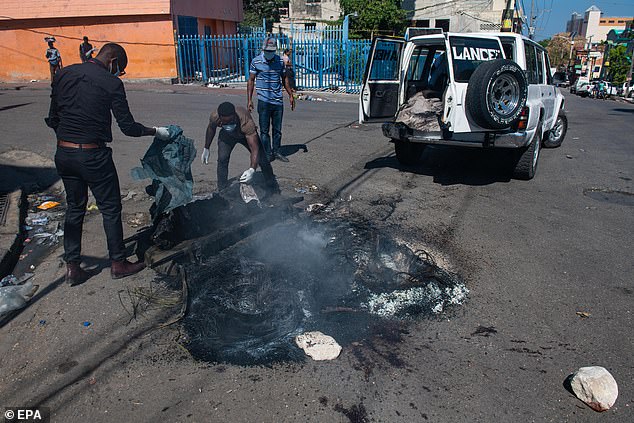
There has been widespread gang-led violence in Haiti, with bodies piling up in the streets in recent days
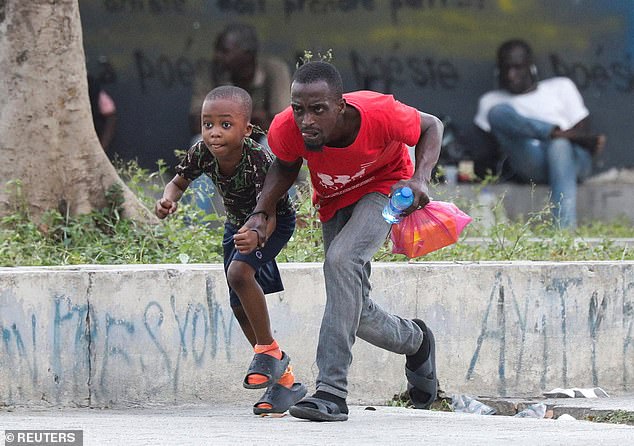
The country has been plunged into chaos and hunger has reached its worst levels ever
Julme’s death marks a setback for the Viv Ansanm alliance, which is making plans to take over Port-au-Prince amid uncertainty.
Barbecue, a former elite operative, is the leader of the most feared gang coalition and he is determined to overthrow Haiti’s shaky government.
The crime boss has captured territory and there are rumors that the gangs are working together to plan a coordinated attack to seize control of the city.
The death also came a day after another gang leader was killed in an apparent revival of vigilante justice, police and sources confirmed.
United Nations Secretary-General Antonio Guterres welcomed reports that political groups in Haiti had selected all members of a transitional council that would take over presidential powers ahead of future elections.
The council, intended to bring together Haiti’s fractured political class, is tasked with appointing a replacement for Prime Minister Ariel Henry, who announced his resignation on March 11 as gang violence prevented his return to the country.
“The Secretary General welcomes reports that Haitian stakeholders have all nominated representatives to the Transitional Presidential Council,” deputy spokesman Farhan Haq said at a media briefing.
The transition plan was developed in Jamaica by the intergovernmental Caribbean Community (CARICOM), together with representatives of the Haitian government and the opposition.
CARICOM has released a list of political groups that would be represented on the council.
The nine-member council was expected to be finalized within a few days of Henry’s resignation, but some Haitian political factions were unable to unite behind one representative.
One party rejected the plan and then backtracked, while groups left out criticized the return of politicians from previous governments seen as corrupt.
Barbecue has threatened reprisals against politicians and their families if they participate in the proposed council.
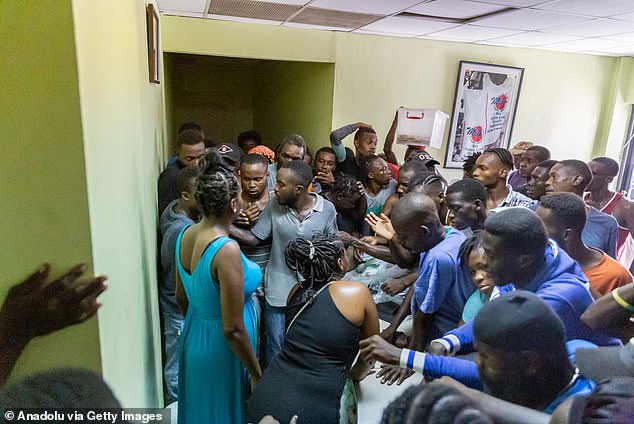
Nearly half of Haiti’s population is struggling to feed themselves as gang violence spreads across the country, with several areas near famine
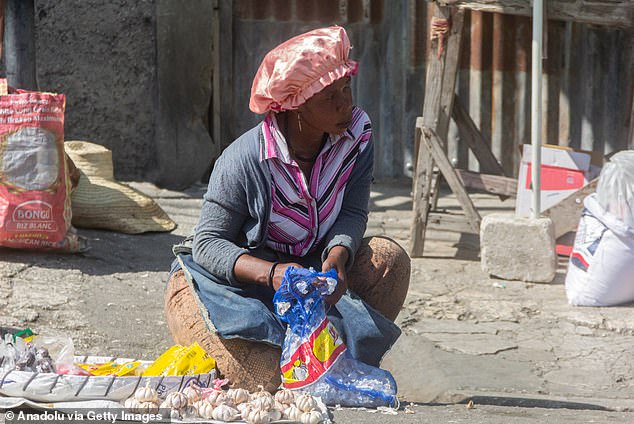
Inflation and poor harvests have also contributed to Haiti’s worst ever level of food insecurity
Heavy gunfire was heard Thursday near the National Palace on Champ de Mars Square in central Port-au-Prince as people fled shootings in the capital’s Petion-Ville suburb.
On Wednesday, suspected gang members were killed and set on fire in Petion-Ville, which has been attacked in recent days, including a leader known as Makandal.
The Caribbean country has been gripped by violence since rival gangs unleashed a wave of attacks this month, including raids on police stations and the international airport.
The conflict has left thousands dead and hundreds of thousands displaced.
The state has been largely absent during the violence and police are ill-equipped to deal with heavily armed criminal groups seeking to expand their territorial control over the capital.
Regional leaders are trying to form a transition council and Prime Minister Henry has pledged to resign once it is established.
But he is currently stranded abroad, locked out after visiting Kenya to discuss the deployment of an international security force. This has now been put on hold.
Nearly half of Haiti’s population is struggling to feed themselves as gang violence spreads across the country, with several areas on the brink of famine, according to international organizations.
Inflation and poor harvests have also contributed to Haiti’s worst ever level of food insecurity, they say.
“Growing hunger is fueling the security crisis that is shattering the country. We need urgent action now – waiting for a large-scale response is not an option,” said Jean-Martin Bauer, Haiti director of the World Food Program.
The Integrated Food Security Phase Classification (IPC) – an organization that establishes a scale used by the United Nations and governments to assess hunger – said in a report that about 4.97 million people out of a population of about 11.5 million people were facing crises or worse levels. of food insecurity.
Eight areas were now in emergency phase – the worst level before the famine, the report said.
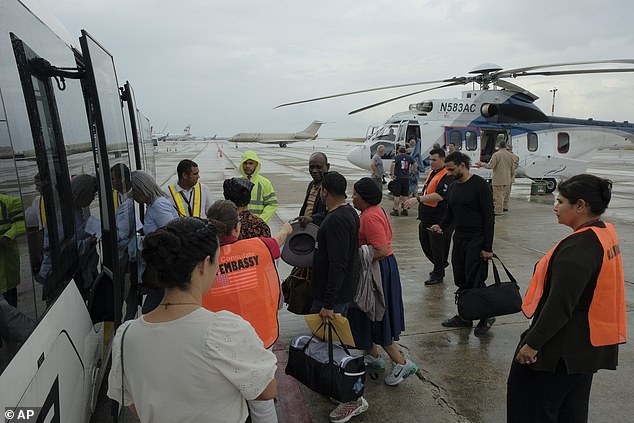
The US government on Thursday organized the departure of 90 American citizens from the northern city of Cap-Haitien in Haiti to Miami and from Port-au-Prince to the Dominican Republic.
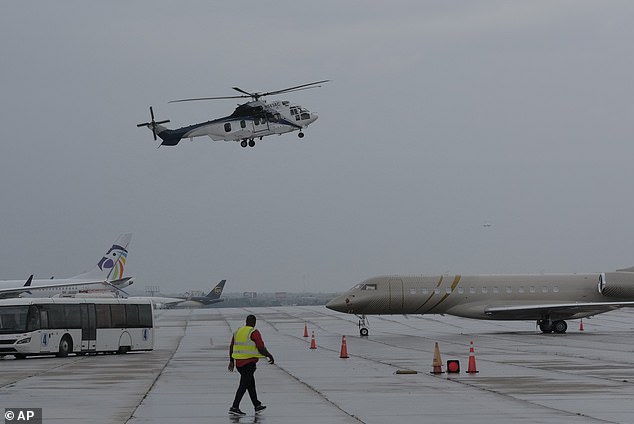
About seventy Americans were evacuated from the country earlier

More than 30,000 people have fled violence and shortages in the capital in just two weeks this month, according to UN data.
These include the Artibonite Valley, Haiti’s agricultural heartland that has been hit hard by gangs expanding from the capital Port-au-Prince, rural parts of the Grand-Anse Peninsula and neighborhoods of the capital such as the poor Cite Soleil district.
According to the WFP, Haiti is now experiencing its worst food insecurity on record, with many people resorting to desperate measures and taking on even more debt as armed groups take over farmlands and steal crops.
The IPC report shows that only five percent of Haitians have received humanitarian food assistance and the WFP says operations are “woefully underfunded.”
The UN and other international agencies and embassies have evacuated staff and other foreigners by helicopter because Haiti’s main airport is not safe.
The US government on Thursday organized the departure of 90 American citizens from Haiti’s northern city of Cap-Haïtien to Miami and from Port-au-Prince to the Dominican Republic.
About seventy Americans were evacuated from the country earlier.
More than 30,000 people have fled violence and shortages in the capital in just two weeks this month, according to UN data. Most of them were people who had already lost their homes and were living in camps or with other families.
While the UN estimates that at least 360,000 people in Haiti are internally displaced.
